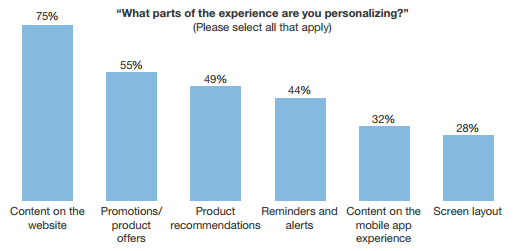Episerver Buys Peerius to Boost Autonomous Personalization
By Venus Tamturk
August 31, 2016
content management, Content Management System, customer engagement, customer experience, Customer Journey, Enterprise Content Management, Episerver, persona, personalization, Web Content Management
Episerver has entered into an agreement to acquire Peerius, a provider of intelligent omnichannel personalization in the cloud, in an effort to create a comprehensive digital experience platform in the cloud.
 CMS-Connected has reached out to James Norwood, Executive Vice President Strategy, CMO at Episerver, and he stated: “This acquisition addresses the industry’s need for smart content personalization. We're excited to combine Peerius’ predictive analytics technology with Episerver's robust Digital Experience Cloud platform to introduce a new era in personalization. Marketers will now be able to automatically tailor digital experiences, giving them time to focus their attention on more creative and strategic work. This progress toward autonomous personalization will further differentiate Episerver from competitors.”
CMS-Connected has reached out to James Norwood, Executive Vice President Strategy, CMO at Episerver, and he stated: “This acquisition addresses the industry’s need for smart content personalization. We're excited to combine Peerius’ predictive analytics technology with Episerver's robust Digital Experience Cloud platform to introduce a new era in personalization. Marketers will now be able to automatically tailor digital experiences, giving them time to focus their attention on more creative and strategic work. This progress toward autonomous personalization will further differentiate Episerver from competitors.”
Episerver introduced role-based personalization to its platform in 2011. Adding an autonomous personalization tool to the Episerver Digital Experience Cloud will allow Episerver to have an impact on some $18B in annual digital commerce revenue today by enabling e-commerce professionals to make one-to-one engagement a reality.
"The acquisition of Peerius is proof positive that Episerver is providing our customers with additional value on top of our core digital marketing, commerce and content management platform," said Mark Duffell, President and CEO of Episerver. "Peerius effectively supercharges the Episerver Digital Experience Cloud's ability to help organizations deliver standout experiences for their customers wherever they engage by injecting real-time, smart personalization into every use case."
The entity will continue operations as Peerius, an Episerver Company, and Peerius CEO Roger Brown will remain in his current role, reporting to Mark Duffell, Episerver President and CEO.
Why is Autonomous Personalization Important?
First off, autonomous personalization tools enable marketers and merchandisers to move in real-time by predictive and adaptive analytics that apply machine learning to big data in order to predict consumer behaviors and deliver a holistic digital experience through highly individualized interactions. Real-time engagement is a fundamental step in the evolution of personalization. However, if personalization isn’t done at the individual level, it shouldn’t really be considered so.
A recent survey of US Consumers and Retailers by Infosys found that among retailers using personalized offers and promotions, 74% experienced an increase in sales; 61%, an increase in profit; and 55%, an increase in customer loyalty. Also, personalized marketing emails receive 29% higher open rates and 41% higher click-through rates, says Experian.
According to the study conducted by Forrester, marketing content used to engage with customers is the most critical area that firms are looking to personalize as 75% of firms surveyed aim to personalize content on their website, which is higher than promotions and product offers (55%), product recommendations (49%), and reminders and alerts (44%).

How can marketers understand their customers and prospects’ intentions and needs?
Marketers should focus on both explicit and implicit insights. While explicit insights can be gained through consumers’ transactions, responses to campaigns, orders, and returns, implicit signals can be attained from time spent on specific product pages, offers hovered over for a certain period of time, previously visited sites, customers’ feelings shared on social media, and what information is shared on online forums. Combining both of these can only result in a comprehensive understanding of their customers and prospects.
It’s critical for marketers to be present and at the forefront of buyers’ minds as soon as they acknowledge their customers need for something. By doing so, if they ignore the importance of buyer behavior, they will set themselves up to fall behind their competitors as maybe only less than 50 purchases will convert from 1,000 leads.
Knowing that any data retrieved from buyer behaviors should be taken into consideration, marketers should never underestimate the power of data. Let me explain with an extraordinary example. One large retail chain found unexpected correlations between weather patterns and consumer behavior:
-
People buy more berries on days with low wind.
-
Consumers buy steak when it's windy and hot, but not raining.
-
Stores sell more salads when winds are low and temperatures are higher than 80 Fahrenheit.
After spotting these relationships, the retailer changed its store displays as well as online ads to promote the specific food items when the meteorologists predicted peak selling weather. As a result, the company saw an 18 percent increase in sales of select items.
What can marketers do with these interconnected insights?
-
They can have a seamless view of their customer in real-time.
-
They can shift their strategy from merely selling products to offering value-added customer service.
-
They can integrate their customers’ activity across channels, behavioral data, and transactional data to their past purchase history in order to complete the entire customer journey in the most accurate way.
-
Those sending mobile offers using real-data are seeing a mobile offer conversion rate that is up to seven times higher. Therefore marketers can take advantage of mobile apps to provide convenience to customers while still attaining behavior insights like real-time location.
-
They can quickly respond with relevant individualized messages to convert prospects to customers.
What marketers shouldn’t do?
-
Brands should be crystal clear about the data they attain and how they utilize it. Violation of consumers’ privacy can go a long way and be very hard to come from if a problem arises. Marketers should always inform consumers about collecting their data.
-
Even the smartest marketing strategy is useless, if your promotion is irrelevant to someone’s interests and they have no use for your products and services. So do not spam them!
Delivering real-time experiences has never been easier to achieve. After all, today’s marketing is just like dating. You need to carefully craft your pickup lines through explicit and implicit insights to attain their interest. However, personalization is only as effective as the weakest channel throughout the customer journey. To keep interest alive you should carefully personalize channels including your landing pages to digital ads before you make your move.

Venus Tamturk
Venus is the Media Reporter for CMS-Connected, with one of her tasks to write thorough articles by creating the most up-to-date and engaging content using B2B digital marketing. She enjoys increasing brand equity and conversion through the strategic use of social media channels and integrated media marketing plans.